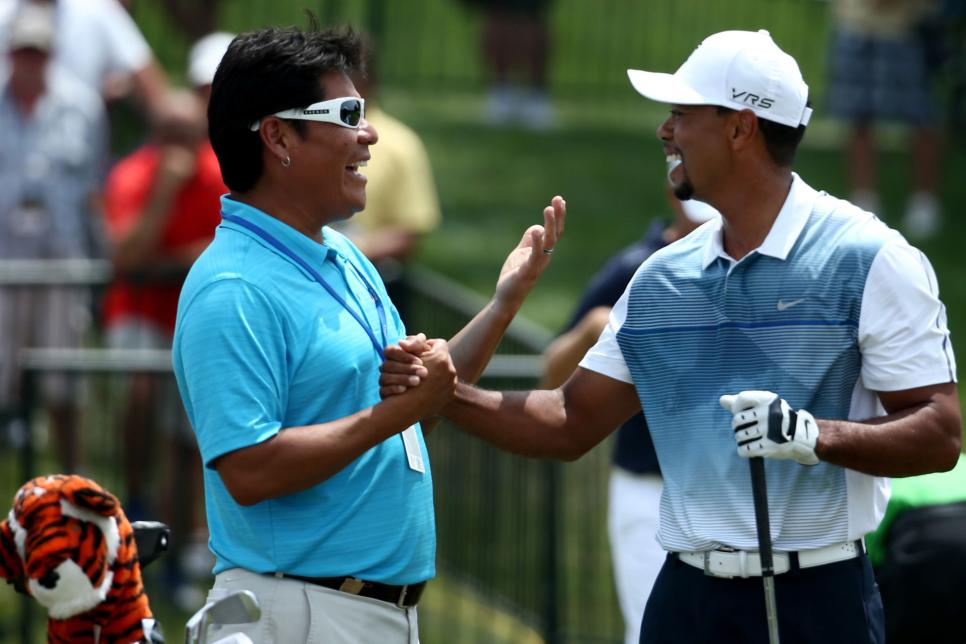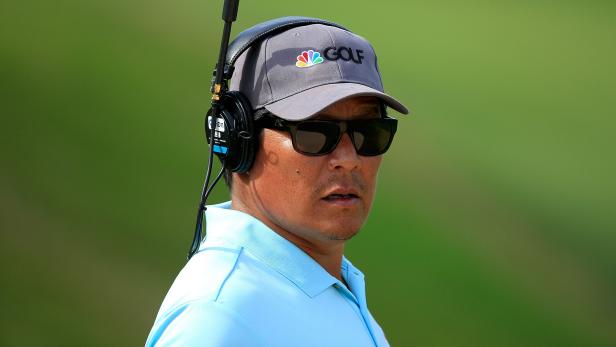For Notah Begay III, there is no escaping the Tiger Woods connection, and he doesn't even try. In fact, when discussing his decade-plus career at NBC this past week, he broached the topic unprompted.
"Initially, and for good reason, a lot of people thought I was just brought in to be the quote-unquote 'Tiger guy,'" he said. "Thankfully, I think I've evolved out of that a little bit, because if he retires anytime soon, and I'm still the Tiger guys, I'm out of a job."
Begay, the 51-year-old who has long been an on-course "walker" for NBC's golf coverage (you can learn more about what that job entails in our Smylie Kaufman feature here), played his college golf at Stanford, where he became friends with Woods. He went on to win four times on the PGA Tour between 1999 and 2000, fought through injuries and slumps for the next decade, and joined NBC in 2012. In the ensuing 12 years, he has made several forays into commentary and analysis, but this weekend, for the first time, he'll have the analyst role to himself for an entire tournament at the Valspar Championship.
"I'm excited and nervous," he said when we spoke two days before the start of play. "If we go back to Johnny [Miller], he made it look so simple and spoke from a strong position of experience. Paul [Azinger] did a wonderful job with his energy, and you could tell he still really loved to watch the game of golf."
Begay is also keenly aware that this is an audition. With Azinger's departure, NBC is testing several potential analysts as it looks to fill the role full-time later this year. The list of claimants to the vacated throne include Kevin Kisner, Brandel Chamblee, and Luke Donald—tough rivals for anyone, and each with a unique skill set. (Jim "Bones" Mackay was the analyst for the Mexico Open in a week when Justin Thomas wasn't playing, but he has no interest in the full-time role.) Begay is aware of the added layer of pressure.
"I mean, there's a definite pressure, but that's what professional athletes deal with all the time," he said. "I spent a career dealing with pressure. ... It's a different kind of pressure because you're being critiqued and evaluated, and that's OK. We should be scrutinized, and called out when we make mistakes, because we should be ready for the big moments."
And if he takes his shot, doesn't get the role, and is back to serving primarily as a walker? Would that embitter him at all? At least in our conversation, he never departed from the "team player" outlook.

As a former teammate of Tiger Woods at Stanford, Begay has a natural connection to the 15-time major winner. But he hopes to prove he's more than just the "Tiger guy" with his performance in the golf analyst chair this weekend at the Valspar Championship.
Warren Little
"You hate to lose at anything," he said. "You get to the PGA Tour because you don't like to lose. But these decisions are made in the best interest of the NBC team, so whatever decisions are made, I'll support it 100 percent. My job at that point, if it isn't me, is to support whoever's in there and allow them to be the best they can possibly be."
Begay praised Tommy Roy, the long-serving lead producer of NBC's golf coverage, and two of his colleagues who helped him develop as a TV personality. One of Begay's great challenges when he started out was interviewing players, both because it wasn't a natural skill and because it felt awkward to speak with his peers in that capacity. By his own reckoning, he froze up on more than one occasion, and was uncomfortable at best. Roger Maltbie was instrumental in helping him through that early rough patch, and the help started with a simple tip: Write a few questions down so you have a crutch when the big moment comes. Molly Solomon, a executive producer with NBC and Golf Channel, helped him with everything from the subtleties of his analysis to—literally—how to sit in a chair to project energy and confidence.
Begay is excited about what he called the "reboot" at NBC, with a younger, more modern energy, and one factor he's happy to talk about is the diversity he would bring to the role. Begay is a Native American, with Navajo, San Felipe Pueblo and Isleta Pueblo roots, and it's a demographic that has almost no visibility in professional golf beyond him. (His name, "Notah," means "almost there," which felt too on the nose to bring up regarding his pursuit of the analyst job.)
"It's hugely important to me to be a good reflection on my Native American community," he said. "Just me having this job at this very point in time as part of the NBC team is a huge step in the right direction. It shows other American Indian kids in high school or college that are thinking about a career in broadcasting or journalism or entertainment, that it is possible."
When pushed past his default position of humility and asked what unique qualities he would bring to a broadcast, Begay cites his investment in all aspects of the game (he's heavily involved in junior golf as organizer of a national tournament with qualifying events held around the country), his connection with the players of a younger generation and that he still plays competitively on PGA Tour Champions. His close connections in every regard, he says, allow him to maintain a critical respect for the sport itself. (He even had a player approach him on the range for a quick lesson at the Players. Though he wouldn't say who, he did promise, with a laugh, to take full credit if that player showed up on the leaderboard at the Valspar.)
It will not be easy for Begay to land the job—it's impossible not to notice that Kisner and Donald have both had multiple appearances at the analyst desk, and that Chamblee will get his second try at the Houston Open, while this is Begay's only scheduled tournament. Still, Begay hopes to surprise people at the Valspar and give the decision-makers something to think about. If he's successful, it might elevate his status with the general golf and TV public above what he considers its current ideal.
"I have the perfect amount of celebrity," he joked. "I can get tickets to any game or show in the country, but I can also walk through most airports without being bothered."




